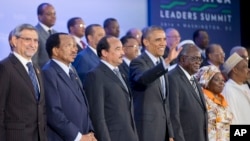The U.S.-Africa Leaders Summit will be held on Dec. 13-15 billed as a meeting that will strengthen ties and boost cooperation.
"Our intentions for the U.S.-Africa Leaders Summit are very forward-looking," Enoh T. Ebong, director of the USTDA, told VOA in an emailed statement.
"USTDA’s goal is to work in equal partnership with Africa’s public and private sectors and leverage our 30 years of experience to shape the future of infrastructure across the continent," she said.
"At the end of the day, we want to offer Africa a positive option for its infrastructure development and economic growth," the Nigerian-born American said, adding that the agency will support "reliable electricity, internet access and connectivity, transportation infrastructure and healthcare infrastructure."
Former U.S. President Barack Obama established the summit in 2014 and hosted 50 African heads of state on what he hoped would be "a partnership grounded in mutual responsibility and respect."
The first U.S.-Africa Leaders Summit centered on encouraging progress in key areas central to what African leaders defined as crucial to the continent's future.
These included expanding trade and investment ties, promoting inclusive sustainable development and expanding cooperation on peace and security. The agenda also involved engaging young African leaders to better the outlook for Africa's next generation.
Under the Donald Trump presidency, the summit did not take place.
Akinola Adeoye at the University of Johannesburg in South Africa described the upcoming Washington summit as a "positive development" to strengthen engagement but said such talks would be more effective on African soil, "particularly in the political headquarters of Africa – Ethiopia."
Analysts say the lack of consensus among African states to denounce Russia’s invasion of Ukraine may have sent a warning to the U.S., prompting it to revamp its damaged image on the continent.
"The way African countries have even voted at the level of the United Nations over the war may have sent a signal to the U.S. that perhaps they’ve made a mistake by trying to turn away or reduce their engagements with Africa," Adeoye said.
When the Russia announced its contested annexation of four Ukrainian regions in October, 19 African states, including South Africa, Mali, the Central African Republic and Ethiopia, abstained from a United Nations General Assembly vote to condemn the move. Twenty-six African nations voted in favor of the resolution.
The abstentions drew sharp criticisms, exposing the results of what analysts characterize as intensifying competition for influence on the African continent.
Recent data by Statista shows that China is still the largest foreign investor in Africa since 2010 at 18%, beating the U.S. which is tied with France at 8%.
"Now is the time for Africa to flex its muscles," Adeoye said, "because the powers that be need African support not only in terms of their resources, but in strategic partnerships."

